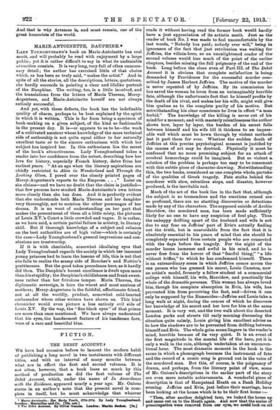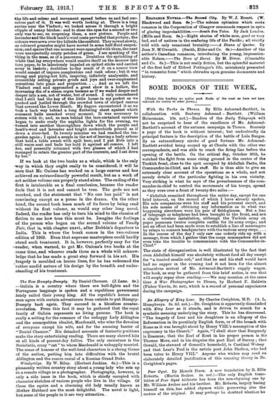FICTION.
THE DEBIT ACCOUNT.f
WE have had occasion before to lament the modern habit of publishing a long novel in two instalments with different titles, and with an interval of many months between what are in effect the first and second volumes. It is not often, however, that a book loses so much by this method of production as did the first volume of The Debit Account, which, under the name of In Accordance with the Evidence, appeared nearly a year ago. Mr. Onions states in an author's note that the present novel is com- plete in itself, but he must acknowledge that whoever • Mario-Antoinette: HOT Beyouth, 1170-1T74. By Lady Younghnsband.
London Idnamittaak mute*. nat.]
t The Dent demnst. By 0 Tor Onions. London; Martin Seeker. [ea] reads it without having read the former book would hardly have a, just appreciation of its artistic merit. Just as the reader of book No. 1 was made to feel uncomfortable by the last words, " Nobody has paid; nobody ever will," being in ignorance of the fact that just retribution was waiting for Jeffries, the villain-hero, so an unenlightened reader of the second volume would lose much of the point of the earlier chapters, besides missing the full poignancy of the end of the book. Long before the close even of Part III. of The Debit` Account it is obvious that complete satisfaction is being, demanded by Providence for the successful murder com- mitted by James Herbert Jeffries. The motive of the murder is never repented of by Jeffries. By its commission he• has saved the woman he loves from an unimaginably horrible fate, although the unfortunate fact that he himself profits by the death of his rival, and makes her his wife, might well give him qualms as to the complete purity of his motive. But; notwithstanding his clear conscience he lives in effect "a man forbid." The knowledge of the killing is never out of his mind for a moment•; and with masterly relentlessness the author shows how, layer by layer, the burden of his secret falls- between himself and his wife till it thickens to an inipass- able wall which must be hewn through by violent methods- lest it part them for ever. Whether the sudden death of Jeffries at this precise psychological moment is justified by the canons of art may be doubted. Physically it must be- confessed that no more promising subject for an attack of cerebral hemorrhage could be imagined. But so violent a. solution of the problem is perhaps too easy to be consonant with this subtle piece of character-drawing. Notwithstanding this, the two books, considered as one complete whole, partake• of the qualities of Greek tragedy. Fate stalks behind the• murderer with slow, relentless steps, and disaster, however produced, is the inevitable end.
Much of the art of the book lies in the fact that, although the subject is so tremendous and the emotions roused are • so profound, there are no startling discoveries or detections made by any of the characters. The supposed suicide of Archie Merridew, the murdered man, has been made sufficiently likely for no one to have any suspicion of foul play. Thus, the unhappy drifting apart of the husband and wife is not due to any fear on Jeffries' part of Evie's actually finding out the truth, but is unavoidable from the fact that it is absolutely essential to his peace of mind that she should be completely separated from certain people who are connected with the days before the tragedy. For the night of the- murder looms immense and awful in his mind, and hs is never free from the horror of that "fearful thing," "a life• without trifles," to which he has condemned himself. There is an extraordinary scene in which Jeffries comes across the one person who has guessed his secret, Louie Canston, now an artist's model, formerly a fellow student at a commercial college with himself, his wife, Merridew, and practically the- whole of the dramatis personae. This woman has always loved him, though his complete absorption in Evie, his wife, has prevented him from perceiving the fact, and—driven it can only be supposed by the Eumenides—Jeffries and Louie take a long walk at night, during the course of which he discovers• her knowledge of his secret and her love for him at the same moment. It is very wet, and the two walk about the deserted London parks and streets till early morning discussing the situation quite calmly, Louie giving him excellent advice as to how the shadows are to be prevented from drifting between himself and Evie. The whole grim scene lingers in the reader's mind, horrible because of its very quiet. It is an event of the first magnitude in the mental life of the hero, yet it is only a walk in the rain, although undertaken at an unconven- tional hour. The most dramatic moment in the book is the scene in which a phonograph becomes the instrument of fate and the record of a comic song is ground out in the voice of the murdered man. But this, of course, is the poignancy of drama, and perhaps, from the literary point of view, some of Mr. Onions's descriptions in the earlier part of the story are even more notable achievements. A wonderful piece of description is that of Hampstead Heath on a Bank Holiday evening. Jeffries and Evie, just before their marriage, have been looking at the house which is to be their first home :— " Then, after another delighted tour, we locked the house up and came out on to the Heath again. And now that the scales of preoccupation were removed from our epee, we could look:on all the life and colour and movement spread before us and feel our- elves part of it. It was well worth looking at. There is a long ravine near the Viaduct ; we looked across it through a bright -stipple of sunny birches : and to dose the eyes for a second or two only was to see, on reopening them, a new picture. Purple and lavender and the black lamb's-wool coats pervaded that picture ; the -colours were sown over the hillside like confetti. They moved slowly, as coloured granules might have moved in some half-fluid suispen- ion; and spaces that one moment were spangled with them, the next 'were unexpectedly empty patches of green. I am speaking of the thing in the mass, as of a panorama. Doubtless the sprinkling of 'white that lay everywhere would resolve itself on the morrow into torn paper, to be laboriously impaled on spiked sticks and carried away in baskets ; doubtless to-day much of it on a nearer view would consist of impure complexions and rank odour ; but it was strong and piping-hot Life, inspiring, infinitely analysable, and irresistibly setting private griefs and joys and over-emphasised sensations into place and proportion.. . . And as we left the Viaduct road and approached a great show in a hollow, the increasing din of a steam organ became as if we waded deeper and deeper into a sea, not of water, but of sound. I only remembered that I still had the key of the little house in my pocket as we pushed and jostled through the crowded town of striped canvas that covered the Lower Heath. My fingers encountered it as we took a back way behind a long fluttering sheet against which cocoanut balls smacked every moment. It was necessary to return with it; and, as men behind the lace-curtained caravans began to make ready the naphtha lights for the evening, we turned into another thoroughfare down which the purple and lamb's-wool and lavender and bright neckerchiefs poured as if • down a river-bed. In twenty minutes we had reached the tea- garden again ; I spied a eouple in tha act of leaving a leafy arbour that held a table awash with spilt beer, and I put Evio into a still warm seat and bade her hold it against all corners. I left her, and presently returned with two glasses of which I had managed to retain the greater part of the contents, and I sat down by her."
If we look at the two books as a whole, which is the only -way in which they ought really to be considered, it will be seen. that Mr. Onions has worked on a large canvas and has -achieved an extraordinarily powerful result, but as a work of art neither volume can properly stand alone. The ending of the first is intolerable as a final conclusion, because the reader feels that it is not and cannot be true. The gods are not mocked, and the statement that "No one has paid" is not convincing except as a pause in the drama. On the other hand, the second book loses much of its force by being read without its first volume, as would any other long novel. Indeed, the reader has only to turn his mind to the classics of ✓ fiction to see how true this must be. Imagine the feelings of the person who began on the second volume of Vanity Fair, that is, with chapter xxxvi., after Dobbin's departure to India. This is where the break comes in the two-volume -edition of 1869. Even that supreme masterpiece could hardly stand such treatment. It is, however, perfectly easy for the --reader, when warned, to get Mr. Onions's two books at the same time, and whoever reads them as a whole will acknow- ledge that he has made a great step forward in his art. His tragedy is moulded on heroic lines, for he has redeemed the rather sordid nature of his design by the breadth and under- standing of his treatment.















































 Previous page
Previous page